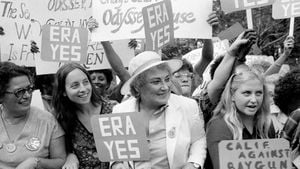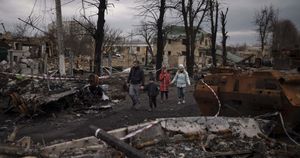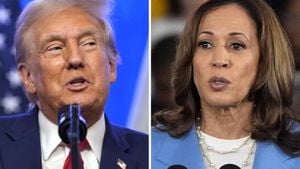African nations are bracing for another round of significant elections, with various countries poised to either reinforce or challenge democratic norms. The approach to governance, electoral integrity, and citizen participation will be under heightened scrutiny as multiple states prepare for pivotal votes.
One of the key events on the horizon is the upcoming general election scheduled for April 2024, where Nigeria, Africa's most populous nation, will determine its next president and legislative members. The stakes are high as political tension rises, underscored by the volatile security environment driven by insurgent activities and widespread calls for reform. Should the elections proceed smoothly, they could be seen as a litmus test for democracy not just within Nigeria but across the continent.
Meanwhile, South Sudan's transitional government has announced plans to extend its administrative framework for two more years. This decision has raised eyebrows from both local critics and international observers, who demand transparency and trustworthiness from the government as they prepare for the 2026 elections. Washington, aligned with several UN Security Council members, recently called for concrete proposals from South Sudanese leaders, stressing the necessity for free and fair elections.
“Women play a key role in promoting peace and stability in South Sudan and must be afforded more space to participate meaningfully at all political levels,” stated representatives from the U.S. government. Their call for women’s empowerment within the political process is indicative of broader international sentiments aimed at fostering inclusive governance.
The inclusion of women, especially those affected by conflict, is imperative not only for social equity but also for effective governance. Women and girls, particularly from internally displaced communities, face alarming rates of gender-based violence, exacerbated by the continued civil strife within the region. The United States and its partners have urged South Sudan’s authorities to deepen their commitments to implementing measures against such violence and to prioritize training for security forces.
Efforts to bolster women's representation come as part of the United Nations' broader agenda to integrate gender equity within all peace processes globally. The calls for including women as electoral candidates, voters, and observers reflect a movement toward inclusivity, which has been pivotal for genuine democratic transitions.
While Nigeria and South Sudan grapple with their pressing electoral challenges, the Democratic Republic of Congo (DRC) also stands at the crossroads. Presidential elections on December 20, 2023, could see President Félix Tshisekedi contend with rising opposition, putting to the test both his leadership and the country’s democratic frameworks. The Congolese electoral process has historically been marred by violence and disputes over credibility. Observers are cautiously optimistic about the potential for peaceful transitions, especially after recent efforts to engage the diaspora for input and participation.
With all eyes on these key nations, experts have raised the importance of international observers and support mechanisms. Observations are more than just formalities; they serve to build trust among citizens and reinforce the legitimacy of outcomes. Proactive engagement from international bodies also raises awareness, enabling potential early interventions to prevent disputes or violence.
Across the continent, civil society organizations and grassroots movements are gaining traction, implementing educational campaigns to prepare voters and encourage active participation. Countries like Kenya, which conducted successful elections earlier this year, have emerged as positive outliers, showcasing the potential for electoral processes to reflect the will of the people where transparency and accountability are prioritized.
Nevertheless, several nations are experiencing challenges such as disinformation campaigns and societal divisions. Observers noted the impact of social media, both as tool for mobilization and as means for spreading misinformation during election periods. This duality poses significant challenges to electoral integrity, necessitating enhanced digital literacy initiatives among voters to combat disinformation.
The threat of disinformation can be particularly corrosive, fostering distrust among voters and undermining faith in democratic processes. Experts suggest the establishment of fact-checking organizations and collaboration with tech platforms to root out false narratives and promote factual discourse.
Political parties must adapt to these shifting dynamics, with many employing advanced analytics to engage voters and spread their messages effectively. Some leaders have recognized the importance of reaching younger demographics through social media campaigns, highlighting the need to address issues pertinent to younger voters, such as economic opportunities and job creation.
Several African nations are also utilizing international frameworks, including African Union mandates, to guide their electoral processes. These frameworks aim to uphold democratic principles, such as pre-election assessments and post-election evaluations. They signal to the populace and the global community of the seriousness with which these nations approach their commitments to democracy.
Despite the momentum seen within many African states toward establishing democratic norms, the path forward remains fraught with obstacles. The legacy of authoritarian governance lingers, and many leaders remain reluctant to relinquish power. The international community plays a significant role here, offering support and resources where needed but also applying pressure when necessary.
Leading up to these elections, citizen engagement is imperative. Voter turnout can be greatly influenced by how well citizens are informed about their rights, the electoral process, and the candidates' platforms. Activists and community leaders are working tirelessly, often at great personal risk, to raise awareness and mobilize communities. Beyond voting, civic education aims to embed democratic principles within the fabric of society, fostering long-term resilience.
Sustaining momentum will require sustained advocacy not only for elections but for transparency, accountability, and rule of law post-election. These components are fundamental to ensuring the newly elected leaders remain committed to the welfare of their constituents and the democratic ideals they have pledged to uphold.
While uncertainty looms over the electoral climate, hope persists. Voices calling for change, reforms, and greater participation are becoming louder. If well-supported and organized, these movements stand poised to redefine the political landscapes across Africa, making a significant mark on the continent's democratic evolution.
With various elections on the horizon, the world's gaze remains fixed on Africa, as nations strive to reconcile their past with aspirations of democratic governance. The upcoming months are set to be pivotal not just for individual countries but for the continent as a whole, as it wrestles with challenges and opportunities alike.



